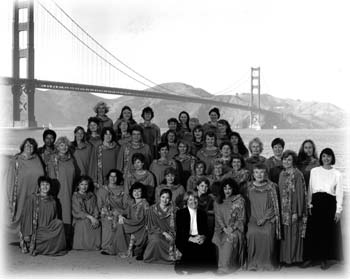![[Metroactive Music]](/music/gifs/music468.gif)
![[Metroactive Music]](/music/gifs/music468.gif)
[ Music Index | Metro | Metroactive Central | Archives ]
Singing the Spirit
 The Peninsula Women's Chorus performs 'Songs of Survival' and sacred mission music By Philip Collins The Peninsula Women's Chorus performed the second of a four-concert South Bay Area tour Saturday (May 17) night at Mission Santa Clara. The program was enthralling, as much for its subject matter as for the chorus's euphonic blends. The first half of the concert focused on repertoire from the California missions; the second consisted of "Song of Survival," a set of 18th- and 19th-century orchestral and keyboard literature adapted for women's chorus. Margaret Dryburgh and Norah Chambers arranged the works in 1943 while they were imprisoned by the Japanese in Sumatra with other women of Dutch, English and Australian nationalities. The choir's rendering of these rare works added up to more than a musical performance. Knowing the context that precipitated their creation helped one appreciate how very magical it must have felt to have first heard these arrangements of Dvorak, Schubert, Beethoven and others. (Some additional sense of that moment can be gathered from the new movie Paradise Road, starring Glenn Close.) Following years of abject incarceration, during which all contact from and with the outside world was prohibited, these beloved opuses must have felt like rain in July. As camp survivor Helen Colijn said during her introductory talk, the settings were, and still are, a testament to "the power of music." No matter that the transcriptions skipped significant portions of the originals; what they salvaged was in and of itself impressive, even transcendent at times. The gently swelling chorale from the Largo of Dvorak's New World Symphony fit the voices naturally, and music director Patricia Hennings coaxed a steady build from the singers that gradually filled the chapel like a sunrise meeting the horizon. The opening allegro to Schubert's Unfinished Symphony was more of a leap to the choral medium, but still it abounded with pleasures. Grieg's familiar Morning from Peer Gynt took on rapturous new warmth, as did Londonderry Air (Danny Boy). Here Is Holiness The mission music was more captivating on pure musical terms. The range of media involved a variety of soloist combinations and instrumental accompaniments, while the styles reached from early anonymous scores to Aptos composer Lou Harrison's 1955 Here Is Holiness, the first movement from his Four Strict Songs. Although Harrison's music is not to be found in the Catholic hymnals, his Navajo-inspired songs were apt for the occasion in the way that they enlarged the program's focus on America's religious lineage. Harrison's praise to nature's divine details ("the holiness of the begonia leaf ... of the mountain's deer") received a smoothly phrased rendering. The choir delivered the score's noble modal melodies with precise complicity and beauty of tone. Pianist Josephine Gandolfi lent vitality and radiance to the work's ingratiating accompanimental refrains, assisted expertly by Rick Kvistad and Deanne Tucker on percussion. The three sacred pieces from Mission San Juan Bautista included some of the evening's most moving music. The anonymous El Cántico del Alba (Canticle of the Dawn) was realized to utmost effect by spreading the choir around the chapel's perimeter. The spatial distancing in no way hampered the ensemble's coordination, and soloists Beatrice Fanning and Cathleen Kalcic brought grace to their endeavors. Hennings segued the choir directly from the Alba into the also anonymous El Padre Nuestro, dramatizing the move from monody (single-line singing) to harmony in the latter work. Renowned renaissance composer Vittoria's Duo Seraphim was not composed stateside but imported from Europe. The performance maintained a buoyancy that kept melodic shapes to the fore, although the altos didn't always carry sufficiently. A del dia a de la fiesta by Jose de Orejon y Aparicio was a colorful and extensive undertaking featuring an instrumentation of two flutes, guitar and piano. The work's diverse charms were compromised by a tuning discrepancy in which the flutes' flatness to the piano created a gnawing tonal unrest that kept the singers uncertain of what to tune to. The final two works, Lanham Deal's Pues mi Dios ha nacido a penar and Ernani Aguiar's Salmo 150, brought the evening to a powerful conclusion--the first through its poignant, mournful canons, the latter with percolating rhythms and sheer exuberance. The strong turnout for the concert was understandable. There is a lack of quality women's choruses in the area, and such intriguing programming is also rare. If you've yet to catch the Peninsula Women's Chorus's present tour, you've still one opportunity: June 1 at 4pm at Mission San Juan Bautista; admission is free. Call 415/322-3100 for details or go to their web site. [ Metro | Metroactive Central | Archives ]
| ||||||||||||||||||||||||||||||
This page was designed and created by the Boulevards team.
Copyright © 1997 Metro Publishing, Inc.